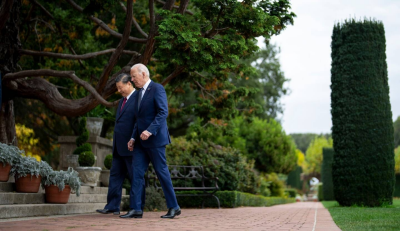The Washington Post-Tech leaders cheer China-US thaw But AI is still a sticking point
November 17, 2023 5 min 1003 words
这篇报道揭示了中美关系解冻的背后,科技领袖们在中美AI竞争中的不安。尽管乐观情绪推动科技巨头股价上涨,但文章强调了围绕先进人工智能和芯片出口管制的分歧。文章中提到,美国已经限制向中国销售关键的先进计算机芯片,而这在当前的AI热潮中显得尤为重要。科技领袖们对中美关系的改善表示欢迎,但对于AI技术的掌控权和开发所需技术的获取仍然存在争议。在APEC峰会期间,中美领导人虽然在会谈中讨论了AI问题,但文章强调了这一关键问题仍未解决。科技行业对于未来的AI发展寄予厚望,但文章指出,中美科技之间的分歧使得两国似乎走向了技术冷战。总体而言,报道透露了科技产业在中美关系复杂性中的脆弱性和担忧。
2023-11-16T22:06:02.151Z
SAN FRANCISCO — Midway through the Asia-Pacific Economic Cooperation summit that has taken over this city this week, top tech leaders from Elon Musk to Apple CEO Tim Cook filed past protesters and heavy police presence to get into the hottest ticket in town: a dinner with Chinese President Xi Jinping.
Cook and BlackRock CEO Larry Fink were among the roughly 300 attendees at this $2,000-a-plate dinner, where Xi spoke of America and China’s history of fighting as allies in World War II and stressed his willingness to be a partner rather than competitor to America.
That evening, Salesforce CEO Marc Benioff posted a photo with Musk on X, formerly Twitter, captioning it: “Go San Francisco! Go APEC! Everyone is here!”
Tech leaders are cheering the thaw in relations between the United States and China, hoping that less tension between the two leading economies means lower risk to the billions of dollars companies make from Chinese consumers and the critical supply chains that crisscross the Pacific. The optimism led to shares of major tech giants from Nvidia to Google rising.
But among the pronouncements and well-wishes, a major issue is still boiling: control over cutting-edge artificial intelligence and access to the technology necessary to develop it.
Beginning last year, the United States has increasingly curtailed the kinds of advanced computer chips that American companies can sell to China, saying that doing so is crucial to national security.
In an hours-long meeting earlier this week, President Biden and Xi did discuss AI, and in a statement afterward, the White House said the two countries had agreed to “address the risks of advanced AI systems and improve AI safety through U.S.-China government talks.” At the same time, Biden emphasized that the two countries are competitors, and the United States had held the line throughout the APEC summit that the export controls over chips that are essential to processing AI are not going anywhere.
“The United States and China for now appear to be heading toward a technology cold war. That has not been fixed, that has not been addressed,” Ian Bremmer, president of global politics research firm Eurasia Group, said in a speech at the summit.
AI fever has gripped the tech world over the last year, after OpenAI released ChatGPT and showed the potential of “generative” AI technology. Big Tech companies and start-ups alike have scrambled to produce new business and consumer products based on the tech, sometimes pushing them out before they’re ready. Governments around the world are studying how to regulate AI, and debate is ongoing about how serious the potential risks of the technology are.
The AI boom has given extra weight to Biden’s chip export controls. Advanced computer chips, especially graphic processing units or GPUs made by Santa Clara, Calif.-based Nvidia, are critical to training and running the massively complex algorithms behind modern AI, and the company’s stock has more than tripled over the last year as businesses all over the world buy the chips faster than it can produce them. Both rounds of the U.S. export controls have impacted Nvidia, and the second round, rolled out last month, specifically blocked the company from exporting a special line of slower AI chips it had been selling to Chinese firms.
While Commerce Secretary Gina Raimondo has said the controls are aimed at China’s military, she has acknowledged they could have a broader impact on China’s economy.
At the APEC CEO Summit on Thursday, tech CEOs took the stage to talk about how important AI is to the future and the world economy.
“It’s going to have a big impact,” Google CEO Sundar Pichai said, but developing the tech safely would require governments to work together on ground rules. “There is no way you make progress over the long term without China and the U.S. deeply talking to each other on something like AI.”
Biden himself mentioned AI in his speech. “The world is at an inflection point where the decisions we make today — this is not hyperbole — are going to shape the direction of the world for decades to come,” he said. “Just think of AI.”
Tech leaders have generally been reluctant to wade directly into the public conversation about the United States and China. Nvidia has warned investors that the export controls could impact its bottom line in the long-term. Microsoft CEO Satya Nadella said in an interview with CNBC on Wednesday that only a small portion of the company’s business is in China. “We don’t see this as a major, major issue for us, quite frankly, other than any disruption to the supply chain,” Nadella said.
But despite statements like that, the tech industry is still intertwined with China, said Jon Bateman, a tech and international affairs analyst at the Carnegie Endowment for International Peace. The U.S. computer chip industry gets a huge portion of its revenue from Chinese buyers. Apple sells tens of billions of dollars worth of phones and services there. And even companies such as Facebook and Google, which are blocked on the Chinese internet, make money from Chinese businesses looking to advertise to international consumers. Thousands of highly skilled Chinese nationals work in the American tech industry.
“U.S. tech companies are very concerned about this trajectory but they feel disempowered and voiceless,” Bateman said. The chip manufacturers are lobbying against the export controls behind the scenes, he said.
“But they are generally unwilling to make a big deal about it in public, because they know the politics are so against them,” Bates said. They “live in fear of being hauled in front of a congressional committee and being called a friend of China.”
John Hudson contributed to this report.

